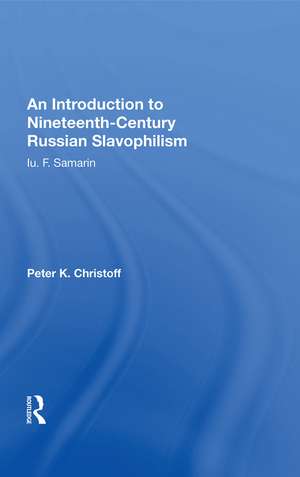An Introduction To Nineteenth-century Russian Slavophilism: Iu. F. Samarin
Autor Peter K. Christoffen Limba Engleză Hardback – 7 iun 2019
Preț: 764.20 lei
Preț vechi: 1027.40 lei
-26% Nou
Puncte Express: 1146
Preț estimativ în valută:
146.23€ • 153.08$ • 120.100£
146.23€ • 153.08$ • 120.100£
Carte tipărită la comandă
Livrare economică 05-19 aprilie
Preluare comenzi: 021 569.72.76
Specificații
ISBN-13: 9780367015886
ISBN-10: 0367015889
Pagini: 480
Dimensiuni: 149 x 229 mm
Greutate: 0.45 kg
Ediția:1
Editura: Taylor & Francis
Colecția Routledge
Locul publicării:Oxford, United Kingdom
ISBN-10: 0367015889
Pagini: 480
Dimensiuni: 149 x 229 mm
Greutate: 0.45 kg
Ediția:1
Editura: Taylor & Francis
Colecția Routledge
Locul publicării:Oxford, United Kingdom
Cuprins
Introduction -- The Making of a Slavophil -- The 1820s: Family and Tutors -- The 1830s: Moscow University -- The Early 1840s: The Dissertation -- Early 1840s: The Struggle with Hegelianism -- Middle 1840s: In the Slavophil Camp -- Middle 1840s: In Government Service -- End of the 1840s: Reviews, Riga, and Prison -- The 1850s: The Slavophils on Science, Technology, and Farming—Koshelev -- The 1850s: Samarin’s Studies and Emancipation of the Serfs -- From Slavophil Orthodoxy to Reform -- Spirit and Meaning of Orthodoxy -- Rationalism, Materialism, and Slavophilism -- National Spirit (Culture): Russia and the West -- Memorandum (Zapiska) on the Emancipation of the Serfs -- The Drive for Emancipation -- Slavophil Collaborators and the Edict of 1861 -- Officiai Nationality -- The “Native Soil” Movement and Pan-Slavism -- Conclusion
Descriere
This work is the fourth volume of Peter Christoff’s study of nineteenth-century Russian Slavophilism, which grew out of vigorous and prolonged debates between the Slavophils and proponents of Slavophilism’s principal ideological rival, Westernism, in the mid-nineteenth century. As the names indicate, the Westerners looked to the West for the solution to Russia’s political, social, and economic problems. The Slavophils, well-to-do members of the Russian gentry who knew the West well, chose to look inward. Both Slavophils and Westerners favored emancipation of the Russian serfs, which was finally achieved in 1861. In this crucial reform, the Slavophils—Iu. F. Samarin in particular — played a leading role. Since the beginning of glasnost’ and perestroika, Slavophilism has been experiencing a revival in the Soviet Union expressed in a number of ways, including the announced republication of the works of A. S. Khomiakov and I. V. Kireevsky. The original Slavophil circle included these two senior Slavophils as well as K. S. Aksakov and Samarin (1819–1876). Samarin was the youngest and most active of the Moscow Slavophils. Endowed with an exceptional mind and character, he was fluent in several languages and attracted attention while still a young student at Moscow University. He played a leading role in the emancipation of the serfs and in other reforms, sometimes risking his own safety. He left more than eleven volumes of collected works and correspondence—the largest written legacy among the early Slavophils and an invaluable source for the study of Moscow Slavophilism as well as Samarin’s life and activities.
